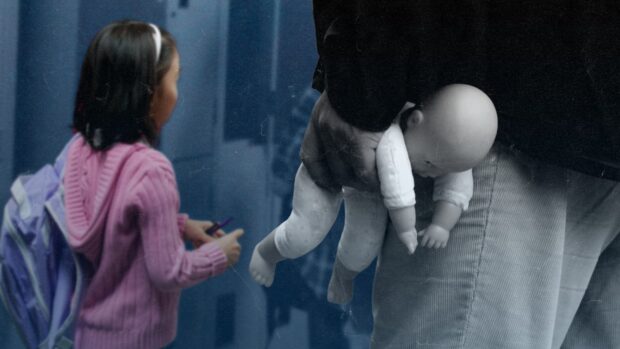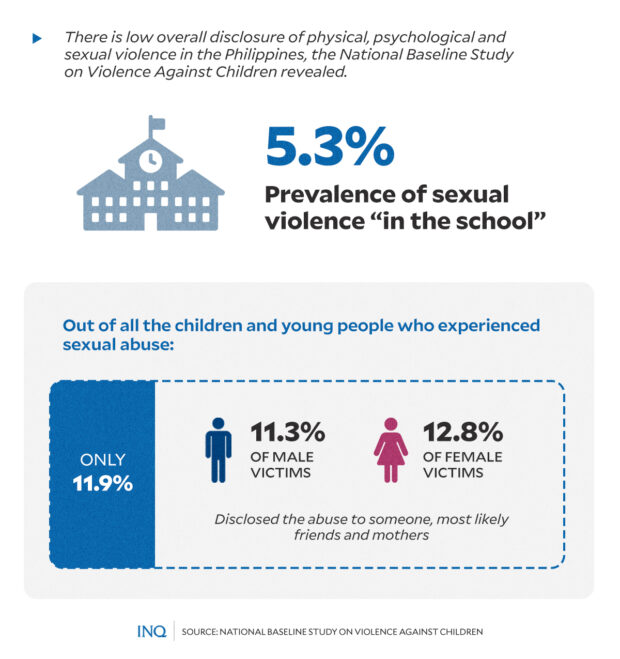Sexual predators prowling schools as group is in disbelief over low number of cases

INQUIRER STOCK PHOTO
MANILA, Philippines—How prevalent is sexual violence in schools?
Over the past year, the Department of Education (DepEd) said its Telesafe Contact Center Helpline has received 70 complaints on sexual harassment against children, or 32.86 percent of the 213 grievances related to physical, sexual, and verbal abuse in schools.
RELATED STORY: Verbal abuse is most reported complaint in DepEd’s helpline
However, Enough is Enough (EIE), a youth group that is keeping track of cases of sexual violence in schools said “there is no way that there were only 70 cases of sexual abuse of students in the past year.”
According to data from the 2015 National Baseline Study on Violence Against Children (NBS-VAC), 17.1 percent of children 13 to 18 years old have experienced sexual violence. Some 5.3 percent took place “in the school.”

GRAPHIC Ed Lustan
“There is an understatement,” Sophie Reyes of EIE said.
Article continues after this advertisementShe explained to INQUIRER.net that “the existence of a hotline is an insufficient device in determining real numbers of sexual abuse cases on campuses nationwide in the span of a year.”
Article continues after this advertisementReyes stressed, too, that on top of taking into consideration the unreported cases, “we know that there are instances where the hotline is nonfunctioning, as we had previously tested it a number of times and received no response.”
DepEd’s Learner Rights and Protection Office (LRPO) said it received 1,709 complaints—almost 1,500 operational concerns, and cases of verbal (77), sexual (70), and physical (66) abuse against children.

GRAPHIC Ed Lustan
READ: A year after launch, DepEd helpline gets 213 cases of abuse of students
Silent screams
Reyes, lead convenor of EIE, which is composed of victims-survivors of sexual violence and advocates for gender equality, pointed out that a lot of factors come into play whether a victim-survivor will report his or her ordeal.
“There is the fear, the social stigma surrounding sexual abuse, and the distrust when it comes to authorities, many of whom have a history of mishandling such cases or lacking sensitivity to approach these in an appropriate and compassionate manner,” she said.
According to the NBS-VAC, out of all the children and young people who experienced sexual abuse, only 11.9 percent—11.3 percent of male and 12.8 percent of female victim-survivors—disclosed the assault to someone, like friends and mothers.

GRAPHIC Ed Lustan
It revealed that some 45.4 percent of child respondents was said to have asked for help from a professional for concerns such as sexual violence, but for those who did not consult at all, the reasons were these:
- They do not see the abuse as a problem
- They are shy or afraid to consult
- They regard their problem as something they themselves can address
- They have someone to consult with aside from professionals
- They don’t want more trouble
- They have no chance to consult
- The person they will consult with might not believe
- They are not comfortable with the professionals
- They are afraid of being blamed
- They do not personally know the professionals
- They lack trust
- The perpetrator is threatening them
For Reyes, “DepEd has not been making the necessary efforts to foster an environment where victim-survivors in schools are encouraged to report incidents, so 70 is definitely an understatement.”
‘Do more’
EIE previously stressed that “our schools cannot continue to resemble places of violence, rather than places of learning” as it pointed out the need to strengthen Republic Act No. 11313, or the Safe Spaces Act.
It said it has kept an eye on at least 60 schools with past and present cases of campus predators since the Safe Spaces Act was enacted into law in 2019, stressing the need for “strong enough guarantees.”
Reyes said to make schools safe for children and young people, educational and training institutions should be mandated to provide psychological, legal, and financial support for victim-survivors.
Likewise, Reyes pointed out that predators and enablers should be charged with criminal and administrative cases and that they be blacklisted and have their professional licenses revoked by the Professional Regulation Commission.
READ: DepEd, CHEd policies shield sexual predators, victims group claims
She said a publicly-available national registry of sex offenders should be created, too, stressing that “these would significantly lessen the incidents of campus-based sexual violence.”
“When it comes to the issue of underreporting, it is imperative that existing anti-harassment policies are taught without intimidation tactics or obfuscation for students to easily understand,” Reyes said.
DepEd’s work
For Reyes, school administrations should respond to reports the right way, offering the resources and support needed by complainants; and that educational institutions should play an active role in encouraging their students to speak up against abuse.
It was explained by Vice President and Education Secretary Sara Duterte that some complaints led to the filing of administrative charges against teaching and non-teaching personnel, but in “simple cases” of misunderstanding, priority was given to reconciling the parties involved.
The DepEd said it would issue guidelines, too, for the implementation of the Safe Spaces Act in basic educational institutions to better address gender-based sexual harassment in schools and ensure a safe and positive learning environment free from gender-based violence.
“The DepEd recognized that the incidence of gender-based sexual harassment may happen in schools. To address these, we formulated guidelines to strengthen its zero-tolerance policy for gender-based sexual harassment,” the LRPO said.